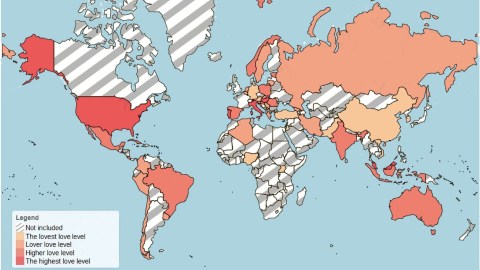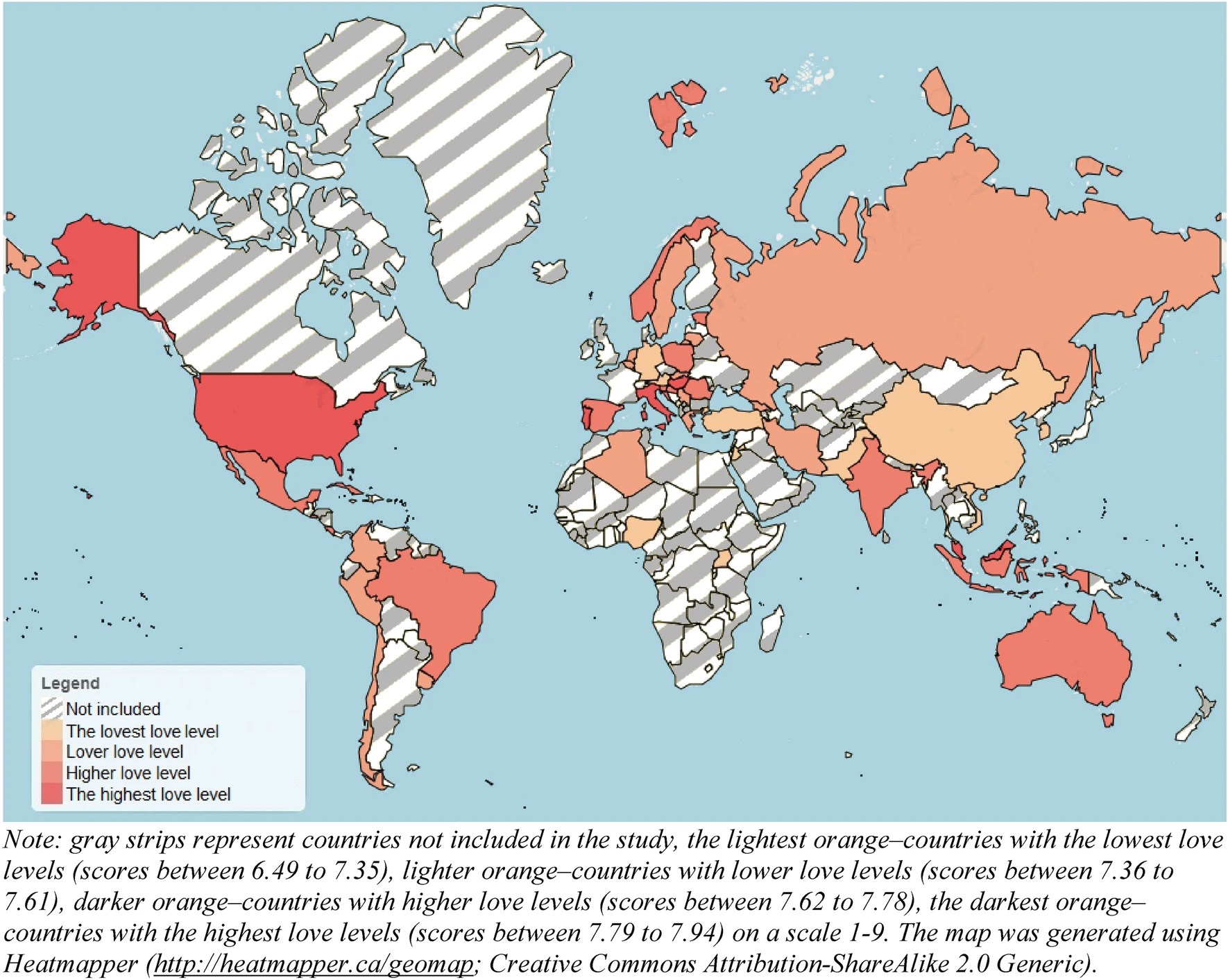Americans are among the most loving, Chinese and Germans the least

- An international team of scientists surveyed 9,474 individuals from 45 different countries about how loving their relationships are.
- Participants in the U.S., Italy, Portugal, and Hungary reported some of the most loving relationships, while participants in China, Germany, Turkey, and Pakistan reported some of the least.
- The researchers also found that a country's modernization, gender equality, collectivism, and temperature were associated with greater feelings of love in relationships.
An international team of nearly 100 scientists has conducted one of the largest studies on love of all time. Their work is published in the journal Scientific Reports.
Psychologist Piotr Sorokowski based out of the University of Wrocław in Poland is first author of the Herculean (or perhaps more Shakespearean) scientific effort. He and numerous colleagues from dozens of countries joined together to survey 9,474 individuals over 18 years old in romantic relationships spread across 45 countries about their experiences of love. Specifically, the authors were curious how country-level factors such as modernization, gender equality, and collectivism were correlated with levels of love. Out of curiosity, they also explored whether a country’s average temperature was correlated with warmer feelings.
A lovely study
To assess love, participants in each country were given a 45-item Triangular Love Scale. Developed by psychologist Robert Sternberg, the questionnaire presents the taker with various statements about their significant other and asks them to rate their agreement with each statement from a level of 1 (not at all) to 9 (extremely). Example statements include, “I share deeply personal information about myself with ______,” and “I find myself thinking about _________ frequently during the day.”
The researchers then averaged the responses of each country’s sample group and checked how they correlated with proxies of modernization (the Human Development Index and World Modernization Index), gender equality (Gender Inequality Index), collectivism (from a large global assessment a decade ago), and temperature.
“We observed that, in general, participants from countries with higher (compared with countries with lower) levels of Human Development Index, World Modernization Index, and gender equality experienced more love with their partners,” Sorokowski and his colleagues summarized. Increased collectivism, the principle of prioritizing the group over the individual, and average temperature were also associated with higher levels.

That modernization and gender equality seemed to bring out more love in relationships did not surprise the researchers. When citizens “are provided with sufficient health care, education, and resources (as in cultures with higher modernization indexes), they may experience more intense love and be more emotionally engaged with their partners,” they wrote. They added, “When women are treated more equally, it might entail their higher agency in choosing with whom they would like to get married (most likely, with someone they love).”
Interestingly, however, in countries with the highest levels of modernization, love tended to fall off slightly. “This suggests that, although a country’s economic development generally promotes more intense love experiences, reaching a certain developmental point might reverse these beneficial love effects,” the researchers commented.
It was also unsurprising that warmer countries also tended to have greater love levels. Higher temperatures encourage people to socialize more, wear more revealing clothing, and be more emotionally expressive.
What was surprising was that collectivism was correlated with stronger feelings. “In more collectivistic countries, love before marriage can be considered a ‘disruptive element’ motivated by selfish interest,” the authors noted.
Participants in the U.S., Italy, Portugal, and Hungary reported some of the most loving relationships, averaging close to an eight on the nine-point Triangular Love Scale, while participants in China, Germany, Turkey, and Pakistan reported some of the least — scoring between 6.5 and 7.4 points.
Limitations
By its design, the study could only detect correlation and not causation. Though the sample group was fairly large, it was not fully representative of the population of each respective country. Subjects also tended to be recruited from academic settings, and so were mostly well-educated and living in urban areas. Still, Cupid would be proud of the effort.





